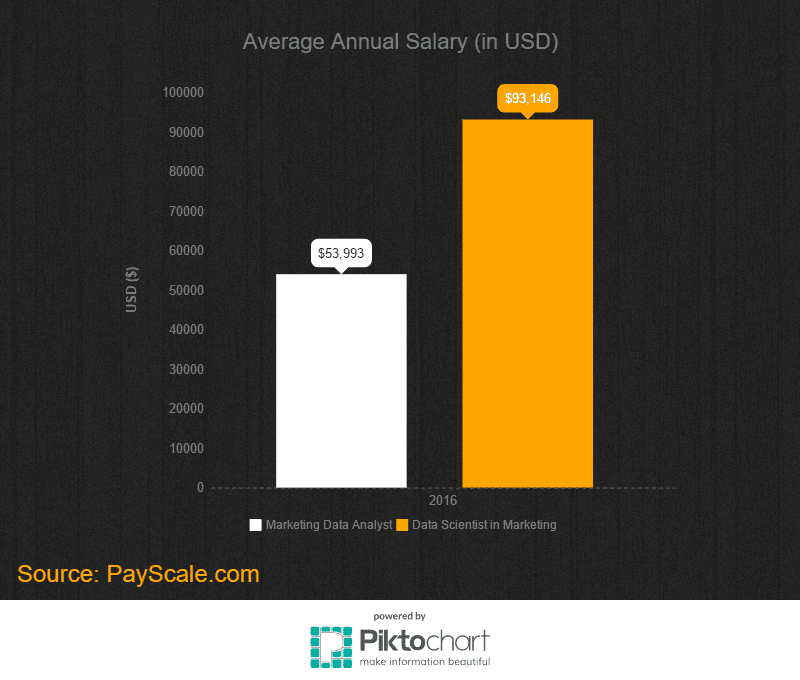At my LinkedIn Profile, I recently got an email from a Dell Recruiter who was looking to interview me for a Marketing Data Scientist position that she was trying to fill. The location was all wrong for me, but the email really got me thinking about marketing data science, and what it was about my LinkedIn profile that had piqued her interest.
I mean, as a small business owner, I wear many hats… In fact, I’d say that about 30% of the work I do with my business is related to marketing efforts. These efforts include social media marketing, content marketing, email marketing, social analytics, Google Analytics, online marketing strategy development, and Facebook advertising – just to name a few! It really does get rather complicated. And since I use my skills in data science and analytics to bolster the marketing efforts of my brand, it makes sense why she would see me as a good fit. I get that part! It’s just “Marketing Data Science?” What exactly is that? Does it pay well? What is the difference between a Marketing Data Analyst and a Marketing Data Scientist?
The whole exchange between me and the recruiter really got me excited about this new area of data science and what’s all involved in it. Today, you’re going to get the complete run-down on data science in marketing, and how you can get started in this fascinating and profitable new niche.
What’s the difference between a “Marketing Data Analyst” & a “Marketing Data Scientist”?
Marketing Data Analysts have been around a lot longer than Marketing Data Scientists, so let’s discuss the Marketing Data Analyst first. Marketing Data Analysts work in a very similar capacity to Business Analysts, except that their efforts are focused solely on marketing initiatives. Marketing Data Analysts collect and analyze both internal and external datasets, and they use the information they surmise to help them plan and implement marketing initiatives for their organization. Marketing data analysts generally produce descriptive and diagnostic insights based on basic data monitoring and trend analysis. A big part of their role is based in market research and planning. As far as technical skill requirements, these professionals stick to using Excel, SQL, and maybe SAS to do their jobs. In the United States, the average salary for a Marketing Data Analyst is $53,993/year (according to PayScale).
Marketing Data Science, on the other hand, is a new niche within data science. It is a data scientist role that focuses exclusively on improving organizational marketing effectiveness. Marketing Scientists analyze both internal and external datasets, and they use the insights they derive to inform their organization about customer behavior, and to advise about modifications or additions to marketing tactics and analysis methodologies. Marketing data scientists are tasked with producing reliable predictive and prescriptive insights based on advanced statistical modeling and/or machine learning methodologies. Another big part of their role is soft skills – they must be able to communicate complex ideas in simple terms, so that management and support personnel can understand and benefit from the work they do. More about the role, skill requirements, and background requirements are listed below.
Marketing Data Scientist, Job Role:
- Generate prescriptive insights – tactical and strategic insights to improve marketing effectiveness
- Exploratory data analysis
- Metric and method selection
- A/B testing
- Advising, training, and assisting management and other professionals in working with and understanding organizational data
Marketing Data Scientist, Required Skills:
- SQL
- Data visualization (Tableau, D3.js, etc.)
- Scripting in Python or R
- Predictive modeling (statistical and/or machine learning methods)
- Great “people skills” – to collaborate with data engineers, business management, and other support personnel
Marketing Data Scientist, Educational and Professional Background:
- A university degree in a quantitative field of study
- Internet marketing experience
- Business analytics experience
When did data science in marketing become a thing?
It wasn’t until last year that “Marketing Data Scientist” was established as its own unique and designated position. Likewise, it wasn’t until 2015 that established organizations like Dun & Bradstreet, Venture Beat, and Marketing Land began publishing on the topic of data science in marketing. What’s more, the first book on the topic also came out just last year (That’s Marketing Data Science: Modeling Techniques in Predictive Analytics… and it looks to have excellent review ratings).
Where can you get the training you need?
There are many online resources. For instance on Data Science and Data Visualization to get you started on your journey towards becoming a (Marketing) Data Scientist.
How much does it pay to be a Marketing Data Scientist?

Why would an organization want to pay almost twice as much?
That is almost twice as much as the average salary of the sister position, Marketing Data Analyst! Why would an organization want to pay almost twice as much to equip its Marketing Department with its very own, designated data scientist? The answer is simple! The predictive and prescriptive insights generated through marketing data science can and do have the capacity to increase the maximum earning potential of today’s businesses; businesses that may have otherwise have remained in competitive stalemate for years to come.
What about YOU?
Have you been considering making a career transition into data science? What is most exciting to you about the field? What factors have kept you hesitating? What type of data science is most of interest to you? We’d love to learn more about you through the comments section below!!
Author bio:
Lillian Pierson, P.E. is a leading expert in the field of big data and data science. She equips working professionals and students with the data skills they need to stay competitive in today’s data driven economy.
She is the author of three highly referenced technical books by Wiley & Sons Publishers: Data Science for Dummies (2015), Big Data / Hadoop for Dummies (Dell Special Edition, 2015), and Big Data Automation for Dummies (BMC Special Edition, 2016).
Lillian has spent the last decade training and consulting for large technical organizations in the private sector, such as IBM, Dell, and Intel, as well as government organizations, from the U.S. Navy down to the local government level.
As the Founder of Data-Mania LLC, Lillian offers online and face-to-face training courses as well as workshops, and other educational materials in the area of big data, data science, and data analytics. Follow me here: Twitter | Linkedin

